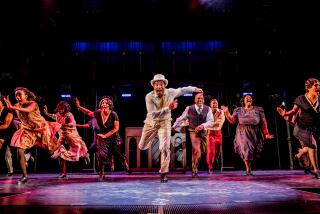O.C. MUSIC REVIEW : Classical, Jazz a Bad Marriage
- Share via
COSTA MESA — Beethoven and jazz. A provocative combination? Or an incompatible concoction?
On the face of it, the Juilliard Quartet’s appearance with the Billy Taylor Trio at the Orange County Performing Arts Center on Tuesday seemed to have some intriguing possibilities. The juxtaposition of the Juilliard’s performance of the Beethoven F-minor Quartet (Op. 95) with Taylor’s jazz improvisations suggested a symphony of opposites: the complex determinism of the middle Beethoven quartet contrasting dramatically with the sudden spontaneity of jazz.
But it didn’t quite work out that way. The evening, presented by the Orange County Philharmonic Society, began well enough with the Juilliard delivering the Beethoven with dispatch and enthusiasm. A difficult work, with harmonic and rhythmic complexities pointing directly to the late quartets, Op. 95 seemed tailor-made for the foursome’s characteristic blend of precision and lyricism.
The Taylor Trio, with Victor Gaskin on bass and Bobby Thomas on drums, followed with two originals, “C.A.G.” and “Suite for Jazz Piano and Orchestra” (arranged for jazz trio). Taylor is too good a pianist to ever play badly, but both pieces suffered from a tight, almost nervous tension that virtually precluded any feeling of rhythmic swing.
“C.A.G.,” a waltz based on the notes of the title, was pleasantly melodic, and the “Suite” touched on funk, gospel and jazz ballad style. Taylor’s soloing, however, failed to capture his familiar crisply buoyant drive. The nonstop streams of notes that overflowed his improvisations were technically impressive but too often lacking in the subtle balance of sound and silence that is the essence of jazz expression.
More serious problems emerged in Taylor’s “Homage,” written for his trio and the Juilliard Quartet. A tribute to jazz string players Eddie South, Stuff Smith, Oscar Pettiford and Slam Stewart, the piece might have worked had it been performed by its honorees. But Taylor’s boppish lines--many of which seemed pianistic, rather than string-like in character--almost completely eluded the Juilliard musicians.
Only violinist Joel Smirnoff--who appeared, in places, actually to be improvising--made the adjustments of vibrato and attack necessary for the proper expression of Taylor’s melodies.
Even so, the real dilemma was that “Homage” was neither good string-quartet writing nor good jazz. The players--both in the Quartet and the Trio--had to labor so hard to find an almost unreachable common ground that they never quite managed to get together to make music.
The unfortunate conclusion was that the program resulted in the best of Beethoven without capturing the excellence of Taylor. The vibrant, hard-swinging be-bop improvisations and attractively lyrical compositions that are the real essence of his music--had there been more of them--might have balanced the evening with an attractive contrast to the Juilliard’s performance.
More to Read
The biggest entertainment stories
Get our big stories about Hollywood, film, television, music, arts, culture and more right in your inbox as soon as they publish.
You may occasionally receive promotional content from the Los Angeles Times.










